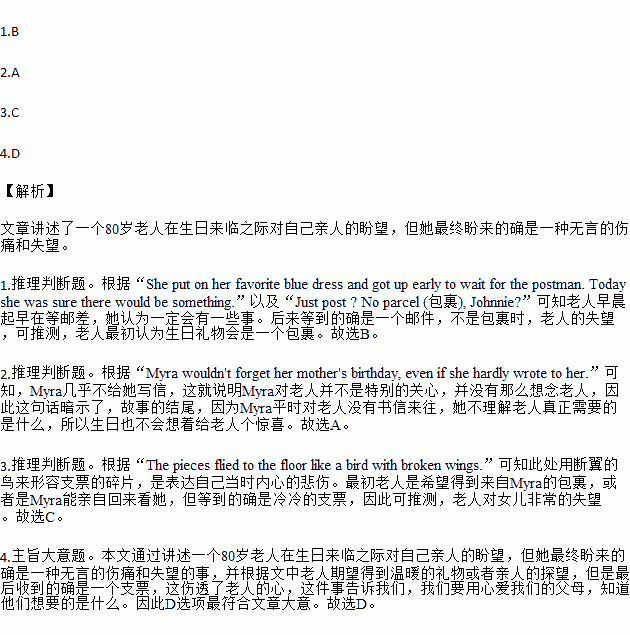题目内容
It was the old lady's birthday. She put on her favorite blue dress and got up early to wait for the postman. Today she was sure there would be something. Myra wouldn't forget her mother's birthday, even if she hardly wrote to her.
The old lady was eighty today. Perhaps Myra might come. After all, eighty was a special birthday. Even if Myra did not come, she would send a present. The old lady was sure of that. She was excited—like a child.
The little boy, Johnnie, said he wouldn’t go out to play until the post came. "I guess you'll get lots of presents," he said, "I did when I was six."
What would she get? Perhaps a new sweater. Emm, blue is such a pretty color. Or a book, a travel book, with pictures, or a little clock, with clear black numbers...
Finally, the postman turned round the corner on his bicycle. Johnnie ran to him at once. "Granny," he shouted, "I've got your post."
"Just post ? No parcel (包裹), Johnnie?" Her heart beat fast.
"No, granny. Maybe the parcel was pretty large to come by letter post. It would come later by parcel post. You must be patient."
She tore the envelope open. It was a card with a message under the printed Happy Birthday—Buy yourself something nice with the check, Myra.
A big number is in the check! But with shaking fingers she tore the check into little bits. The pieces flied to the floor like a bird with broken wings. Her present, her lovely present.
1.Which one was the old lady’s first choice as her birthday present?
A.Her daughter could come to hers. B.Her daughter could send a parcel.
C.Her daughter could send a post. D.Her daughter could give a check.
2.Which sentence can imply (暗示) the sad ending of the story?
A.Myra wouldn't forget her mother's birthday, even if she hardly wrote to her.
B.Perhaps Myra might come.
C.Even if Myra did not come, she would send a present.
D.The old lady was sure of that.
3.Why did Johnnie’s granny tear the check into bits?
A.Because she wanted to play a joke with Johnnie.
B.Because she wasn’t pleased with the number on the check.
C.Because she was disappointed with her daughter.
D.Because she was too happy to get the lovely present.
4.According to the passage, what can we learn from it?
A.Don’t forget mother’s birthday. B.Send the present by ourselves.
C.Mother always loves children deeply. D.Love parents by heart.
 阅读快车系列答案
阅读快车系列答案请阅读下面短文,根据短文内容,在下面的表格中填入与文章意思最符合的单词,并将答案写在答题卷相应的位置上。每空一词。
When we are hurt or suddenly feeling unwell, what we need to do is to treat it in the right way. How can we do that? First aid (急救)teaches you to deal with emergencies (突发清况)correctly.
Nosebleed (流鼻血)
Ask him or her to lean forward (前倾)and pinch (捏住)the nose. It is wrong to move the head backward. If the bleeding doesn’t stop after five to six minutes, then you should find a doctor.
Broken bone
If the bone is broken, take away clothing from the wound and keep the hurt body part still (不动的).Then, find an adult or call 120 for further help.
Fainting (昏厥)
Have him or her lie with feet lifted a little. Make sure he or she can breathe and let fresh air in. Clean the person's face with a cool cloth.
Learning first aid is not only good for helping others, but it can also benefit (使....受益)ourselves.
You can visit the official website of China First Aid Training to learn more about first aid. Reading books and watching videos on free apps are also good ways.
First aid It teaches you to deal with emergencies in a 1. way. | |
Nosebleed | Ask him or her to lean forward and pinch the nose. Don't 2. the head backward. |
Broken bone | If the bone is broken, we should take away clothing from the wound and shouldn't move the 3. body part. |
Fainting | Clean the person's4. and make sure he or she can breathe and let fresh air in. |
How can we learn more about first aid? | By 5. the official website. By reading books and watching videos on free apps. |

